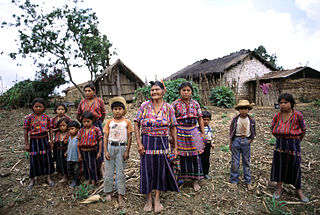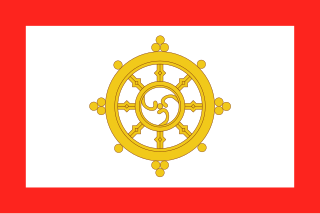Related Research Articles

Cultural imperialism comprises the cultural dimensions of imperialism. The word "imperialism" describes practices in which a country engages culture to create and maintain unequal social and economic relationships among social groups. Cultural imperialism often uses wealth, media power and violence to implement the system of cultural hegemony that legitimizes imperialism.

Colonialism is the pursuing, establishing and maintaining of control and exploitation of people and of resources by a foreign group of people. Implemented through the establishment of coloniality and possibly colonies, this colonization keeps the colonized territory and people socio-economically othered and subaltern to the colonizers and the metropole. While commonly advanced as an imperialist regime, colonialism can take the more particular and potentially autonomous form of settler colonialism, when colonial settlers pursue a more complete colonization of the land and people, often towards a replacement and possibly even genocide of the native populations.

A medicine man or medicine woman is a traditional healer and spiritual leader who serves a community of Indigenous people of the Americas. Individual cultures have their own names, in their respective languages, for spiritual healers and ceremonial leaders in their particular cultures.

There is no generally accepted definition of Indigenous peoples, although in the 21st century the focus has been on self-identification, cultural difference from other groups in a state, a special relationship with their traditional territory, and an experience of subjugation and discrimination under a dominant cultural model.

The term multiculturalism has a range of meanings within the contexts of sociology, political philosophy, and colloquial use. In sociology and in everyday usage, it is a synonym for ethnic pluralism, with the two terms often used interchangeably, and for cultural pluralism in which various ethnic and cultural groups exist in a single society. It can describe a mixed ethnic community area where multiple cultural traditions exist or a single country within which they do. Groups associated with an indigenous, aboriginal or autochthonous ethnic group and settler-descended ethnic groups are often the focus.
An ethnicity or ethnic group is a group of people who identify with each other on the basis of perceived shared attributes that distinguish them from other groups. Those attributes can include a common nation of origin, or common sets of ancestry, traditions, language, history, society, religion, or social treatment. The term ethnicity is often used interchangeably with the term nation, particularly in cases of ethnic nationalism.

Pacific Islanders, Pasifika, Pasefika, Pacificans or rarely Pacificers are the peoples of the Pacific Islands. As an ethnic/racial term, it is used to describe the original peoples—inhabitants and diasporas—of any of the three major subregions of Oceania.
A multinational state or a multinational union is a sovereign entity that comprises two or more nations or states. This contrasts with a nation state, where a single nation accounts for the bulk of the population. Depending on the definition of "nation", a multinational state is usually multicultural or multilingual, and is geographically composed of more than one country, such as the countries of the United Kingdom.

In anthropology and geography, a cultural area, cultural region, cultural sphere, or culture area refers to a geography with one relatively homogeneous human activity or complex of activities (culture). Such activities are often associated with an ethnolinguistic group and with the territory it inhabits. Specific cultures often do not limit their geographic coverage to the borders of a nation state, or to smaller subdivisions of a state.

Nagas are various ethnic groups native to northeastern India and northwestern Myanmar. The groups have similar cultures and traditions, and form the majority of population in the Indian state of Nagaland and Naga Self-Administered Zone of Myanmar (Burma); with significant populations in Manipur, Arunachal Pradesh and Assam in India; Sagaing Region and Kachin State in Myanmar.
The Native American name controversy is an ongoing discussion about the changing terminology used by the Indigenous peoples of the Americas to describe themselves, as well as how they prefer to be referred to by others. Preferred terms vary primarily by region and age. As Indigenous peoples and communities are diverse, there is no consensus on naming.

A tribal chief, chieftain, or headman is the leader of a tribal society or chiefdom.
In Canada, an Indian band, First Nation band or simply band, is the basic unit of government for those peoples subject to the Indian Act. Bands are typically small groups of people: the largest in the country, the Six Nations of the Grand River First Nation had 22,294 members in September 2005, and many have a membership below 100 people. Each First Nation is typically represented by a band council chaired by an elected chief, and sometimes also a hereditary chief. As of 2013, there were 614 bands in Canada. Membership in a band is controlled in one of two ways: for most bands, membership is obtained by becoming listed on the Indian Register maintained by the government. As of 2013, there were 253 First Nations which had their own membership criteria, so that not all status Indians are members of a band.
An ethnoreligious group is a grouping of people who are unified by a common religious and ethnic background.
Cultural practice is the manifestation of a culture or sub-culture, especially in regard to the traditional and customary practices of a particular ethnic or other cultural groups.

Sikkimese are people who inhabit the Indian state of Sikkim. The dominance ethnic diversity of Sikkim is represented by 'Lho-Mon-Tsong-Tsum' that identifies origin of three races since seventeenth century. The term 'Lho' refers to Bhutias (Lhopo) means south who migrated from Southern Tibet, the term 'Mon' refers to Lepchas (Rong) lived in lower Eastern Himalayas and the term 'Tsong' refers to Limbus, another tribe of Sikkim. The pre-theocratic phase of Sikkim was inhabited by the Kiratis, “Sikkim is also known as the home of the Kirati tribesmen from the pre-historic times. Society in Sikkim is characterised by multiple ethnicity and possesses attributes of a plural society. The present population of Sikkim is composed of different races and ethnic groups, viz., the Lepchas, the Bhutias, the Nepalis and the Plainsmen, who came and settled in different phases of history. The historic 8 May agreement between Chogyal, Government of India and political parties of Sikkim defines Sikkimese as Sikkimese of Bhutia-Lepcha origin or Sikkimese of Nepali origin including Tsongs and Schedule castes. The community in Sikkim is inclusive of three sub-cultural sectors: the Kiratis, the Newaris and the Indian Gorkhas.
In Australia, Canada, New Zealand and the United States the term treaty rights specifically refers to rights for indigenous peoples enumerated in treaties with settler societies that arose from European colonization.
Indigenism can refer to several different ideologies that seek to promote the interests of indigenous peoples. The term is used differently by various scholars and activists, and can be used purely descriptively or carry political connotations. There are a range of ways to define Indigenous identity, including political, legal, cultural, and geographic distinctions.

There is no single system of races or ethnicities that covers all modern Latin America, and usage of labels may vary substantially.
References
- ↑ Peoples of the world by National Geographic Society
- ↑ "Frequently Asked Questions: Declaration on the Rights of Indigenous Peoples" (PDF). United Nations Permanent Forum on Indigenous Issues. Retrieved 2009-10-23.
- ↑ Acharya, Deepak and Shrivastava Anshu (2008): Indigenous Herbal Medicines: Tribal Formulations and Traditional Herbal Practices, Aavishkar Publishers Distributor, Jaipur- India. ISBN 978-81-7910-252-7. pp 440